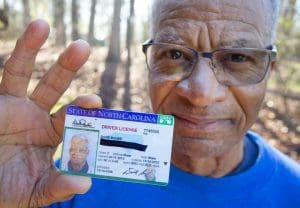Judges strike down North Carolina ID law aimed at suppressing Black vote
Republicans passed the voter ID law in 2018.

A panel of judges in North Carolina on Friday struck down a voter ID law Republicans in the state Legislature passed in December 2018, ruling that it “was motivated at least in part by an unconstitutional intent to target African American voters.”
“The majority of this three-judge panel also finds that the Defendants have failed to prove, based on the evidence at trial, that S.B. 824 [the voter ID law] would have been enacted in its present form if it did not tend to discriminate against African American voters,” the judges continued. “Other, less restrictive voter ID laws would have sufficed to achieve the legitimate nonracial purposes of implementing the constitutional amendment requiring voter ID, deterring fraud, or enhancing voter confidence.”
Republican state legislators in North Carolina have been trying to implement voter ID laws for nearly a decade, but the attempts have failed as judges — both at the state and federal levels — have ruled the laws were unconstitutional.
A similar voter ID law passed in 2013 was struck down in 2016, with a federal judge also ruling the legislation targeted Black voters “with almost surgical precision” and amounted to a solution “for problems that did not exist.”
The 2018 law sought to make changes to the 2013 version that Republicans hoped would allow it to be enforced. The law expanded on the kind of IDs that qualified North Carolinians to vote.
However, the plaintiffs who sued said the law still targeted Black voters, who they said are less likely to have ID and would face undue burdens to obtain such documentation to allow them to vote.
The plaintiffs — a group of Black voters in the state — wrote in their suit:
Requiring voters to take time away from work, forgo compensation, and arrange or pay for transportation to travel for potentially hours to obtain a voter photo ID card for no other purpose than to cast a regular ballot constitutes an undue burden — and in some cases, an insurmountable barrier — on voters who previously needed only to walk to their local precinct on Election Day to cast such a regular ballot.
Republican lawmakers across the country have pushed for voter ID laws for years, painting it as a solution to “voter fraud.”
However, experts say voter fraud is exceedingly rare, especially voter impersonation, which is what voter ID laws purport to prevent.
“It is more likely that an American will be struck by lightning than that he will impersonate another voter at the polls,” the Brennan Center for Justice wrote in a 2007 report.
Still, 36 states require some form of ID to cast ballots at the polls, according to the National Conference of State Legislatures.
And Republicans are now passing laws that would require people to submit ID to vote absentee.
However, voter ID laws are not the only way Republicans are seeking to make it harder to vote.
In the wake of former President Donald Trump’s 2020 election loss, Republican-controlled states have passed numerous laws restricting voting, including laws that make it harder to access absentee ballots, that limit the amount of time voters have to cast ballots, and that even make it a crime to hand out food and water to people waiting in long lines to vote.
Democrats in Congress are pushing to preserve access to the ballot for eligible voters across the country through federal voting rights legislation that would prevent many of these restrictive laws from going into place.
Published with permission of The American Independent Foundation.
Recommended

New NC GOP chair flirts with bogus stolen election conspiracies
Simmons predecessor was a staunch 2020 election denier
By Jesse Valentine - April 19, 2024
Texas activists pushed abortion restrictions in NM cities and counties, records show
Emails reveal influence and control in exchange for promises of legal help
By Austin Fisher, Source NM - March 04, 2024
Cannabis workers across Missouri begin push to unionize dispensaries
The first day was a breeze. Sean Shannon and Danny Foster walked into several marijuana dispensaries around Missouri with their matching “Union For Cannabis Workers” shirts and talked to employees about the possibility of unionizing. “The first day, there were 57 stops amongst the teams,” said Shannon, lead organizer with UFCW Local 655, which actually […]
By Rebecca Rivas - December 04, 2023










































































